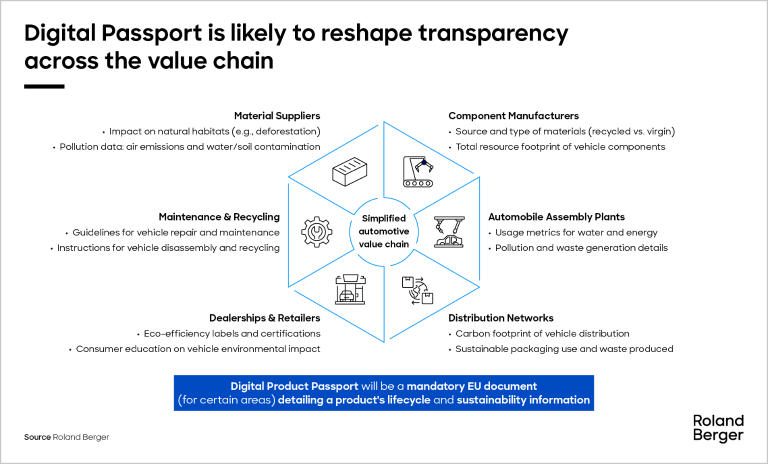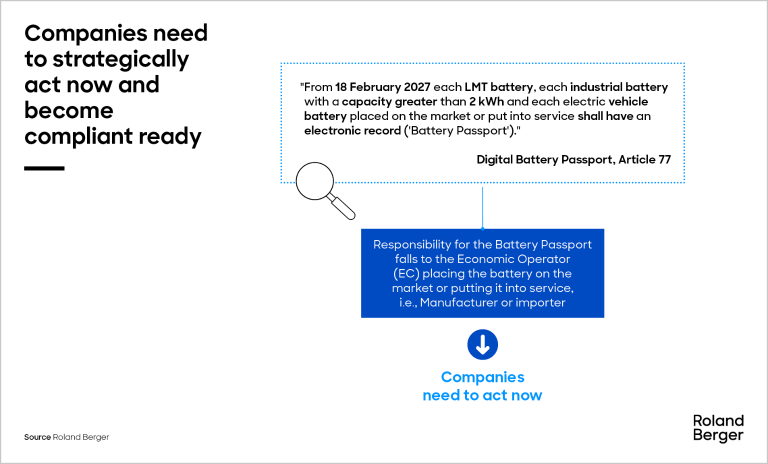Digital transformation can be a complex process. Roland Berger can guide you through each aspect - and unlock your organization's full potential.


EU’s Digital Product Passport regulations set to take effect
The Digital Product Passport will enhance transparency and sustainability across industries; companies need to start preparing now.
The concept of a Digital Product Passport (DPP) is becoming increasingly important in the dialog around sustainable production and responsible consumption in the European Union. As nations and corporations pivot towards greener practices, DPP could be an important enabler. An ambitious initiative, the EU’s decision to introduce DPPs is set to revolutionize how product sustainability is monitored and managed across various industries. Anchored in the broader Ecodesign for Sustainable Products Regulation, which was approved by the European Parliament in April 2024, the DPP aims to bolster transparency at a global scale for various industries across almost all sectors.

In essence, the DPP will be a structured collection of product-related data, with clear ownership and predefined access rights, marked by a unique data carrier such as a QR code. It will include crucial information about the product, including the materials used, manufacturing methods, sustainability features, and guidelines for repair and recycling, among other details.
"Preparing now for the battery passport regulation is not just about compliance: it’s a strategic move towards sustainability and transparency."
The applications of the DPP are broad and impactful. For consumers, it offers transparent information about a product's sustainability, enabling them to select products that match their
environmental values.
For manufacturers, the DPP offers a way to demonstrate compliance with regulatory requirements and to optimize their supply chains by utilizing the comprehensive data contained within the DPP.
One of the first implementations of the DPP in the EU will be a “battery passport,” as mandated under Article 77 of the new
EU Battery Regulation.
Set for compulsory adoption by February 18, 2027, the battery passport will be an electronic record containing information collected along the battery’s life cycle.
While European authorities have not yet outlined the exact information required for a battery passport, the Battery Pass Consortium, a three-year, €8.2 million initiative, is actively working to define these details. They propose that the passport should include 90 distinct data points across seven content clusters such as carbon footprint or supply chain due diligence.
However, the content and implementation details of the battery passport and other DPPs are not yet finalized – companies will need to navigate significant complexity and uncertainty in the near future.
"Effective data management is crucial. Use platforms like Manufacturing-X and Catena-X for secure data exchange."
Companies need to act now to prepare for the DPP
Assignment of responsibility
The first step in preparing for the DPP involves designating a dedicated multidisciplinary working group within the company. This group will be responsible for understanding and managing the intricacies of the passport. By setting up this team early, companies can ensure they have the expertise and resources ready to efficiently address all regulatory requirements from the beginning.
Keeping up with regulation changes
It is essential for companies to stay informed about the DPP’s dynamic regulatory landscape, especially as industry-specific details will be disclosed in various delegated acts, each with its own unique timeline and requirements. This means businesses need to continually update their knowledge base. For the battery passport, this can be achieved by utilizing resources such as the Battery Pass Consortium, which drafts recommendations for the design and implementation of the battery pass for the European Commission.
Data collection
All companies, especially manufacturers, should
accelerate data collection
today. If this poses a strategic obstacle to your company, start by focusing on data connected to recycling, repair, and reuse to identify any shortcomings in current processes. This proactive approach will facilitate compliance with regulations and provide companies with ample time to refine their strategies accordingly.
Data management
Companies should aim to standardize data sharing methods across the value chain. Platforms such as Manufacturing-X and Catena-X are designed to facilitate secure and efficient data sharing. These ecosystems use standardized protocols and formats like the Eclipse Dataspace Connector, ensuring that data from different sources is compatible and easily integrable.
The battery passport is just one illustration of how the Digital Product Passport will be implemented. As regulations continue to evolve, companies need to take strategic action now to remain at the forefront of these changes.
Roland Berger has worked with numerous clients to assess how readily they can adapt to new regulations; we can help your company prepare for a variety of scenarios. For more information, please contact us.
This article is for informational purposes only and is not offered as professional advice for any specific matter. Professional advice should always be sought before taking any action or refraining from taking any action based on this article. Roland Berger group of companies ("Roland Berger") and the editors and the contributing authors do not not assume any responsibility for the completeness and accuracy of the information contained therein and expressly disclaim any and all liability to any person in respect of the consequences of anything done or permitted to be done or omitted to be done wholly or partly in reliance upon the whole or any part of the article. External websites may link to the article. Roland Berger is not responsible for the content or operation of any such external sites and disclaims all liability, howsoever occurring, in respect of the content or operation of any such external websites.
Sign up now to receive regular insights on digital transformation and value creation via e-mail.









